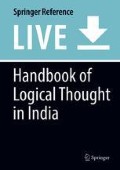Abstract
The Jainas used variations of the pan-Indian sets of dialectical, epistemological, and logical principles in order to justify their ontological and soteriological convictions. The article analyses the application of logical principles in an ontological argument of a Jaina Digambara author. After the explication of the ontological aspect of the argumentation, central logical principles are examined against the backdrop of their definitions in Digambara Sanskrit works.
References
ANIS. Alt- und Neu-Indische Studien
ĀPṬ Āpta-parīkṣā-ṭīkā. 1913. Vidyānandin: vidyānandasvāmi-viracitā ... āptaparīkṣā patraparīkṣā ca gajādharalālajainaśāstriṇā sampādite. (SJG 1). Kāśī.
Balcerowicz, P. 2001. Jaina epistemology in historical and comparative perspective. Critical edition and English translation of logical-epistemological treatises (ANIS 53.1–2). Stuttgart.
Balcerowicz, P. 2003. Is “Inexplicability Otherwise” (anyathānupapatti) Otherwise Inexplicable? Journal of Indian Philosophy 31 (1–3): 343–380.
Balcerowicz, P. 2013. Summary of prabhācandra’s prameyakamalamārtaṇḍa. In: Potter/Balcerowicz 2013: 85–211. [The references above refer to the page numbers of the philologically more exact version of Balcerowicz’ article, which is available at the author’s website, www.orient.uw.edu.pl/ balcerowicz, last accessed January 24, 2016.]
Bhargava, D. 1973. Mahopādhyāya yaśovijaya’s jaina tarka bhāṣā. With translation and critical notes. Delhi.
Bhattacharya, H.S. 1967. Pramāṇa-naya-tattvālokālaṃkāra of Vādi Devasūri. Bombay.
Clavel, A. 2008. La théorie de la connaissance dans le Laghīyastraya d’Akalaṅka. Vol. I-III. Thèse de doctorat. Lyon.
Dunne, J.D. 2004. Foundations of dharmakīrti’s philosophy. Boston.
Ganeri, J. 2001. Philosophy in classical india. The proper work of reason. London/NewYork.
Ganeri, J. 2012. Identity as reasoned choice. New York.
Ghoshal, S.C. 1940. see PMS.
Gorisse, M.-H. 2015. The taste of the mango. A jaina-buddhist controversy on evidence. International Journal of Jaina Studies (Online) 11 (3): 1–19.
Guha, N. 2012. Tarka as cognitive validator. Journal of Indian Philosophy 40: 47–66.
Halbfass, W. 1992. On being and what there is. Classical vaiśeṣika and the history of Indian ontology. Journal of Indian Philosophy 39 (4-5): 553–569.
Kang, S.Y. 2010. An inquiry into the definition of tarka in Nyāya-tradition and its connotation of negative speculation. Journal of Indian Philosophy 38: 1–23.
Kellner, B. 2004. Why infer and not just look? Dharmakīrti on the psychology of inferential processes. In The role of the example (dṛṣṭānta) in classical Indian logic, ed. Shôryû Katsura and Ernst Steinkellner, 1–51. (WSTB 58). Wien.
Kellner, B. 2007. Jñānaśrīmitra’s anupalabdhirahasya and sarvaśabdābhāvacarcā. A critical edition with a survey of his anupalabdhi-theory. (WSTB 67). Wien.
Mookerjee, S., and N. Tatia. 1946. Pramāṇa-mīmāṃsā. A critique of the organ of knowledge. Calcutta.
Oberhammer, G., E. Prets, and J. Prandstetter. 1991, 1996, 2006. Terminologie der frühen philosophischen Scholastik in Indien. Band I-III. Ein Begriffswörterbuch zur altindischen Dialektik, Erkenntnislehre und Methodologie, ed. G. Oberhammer. Wien.
Oetke, C. 1994. Studies on the Doctrine of trairūpya. (WSTB 33). Wien.
PaP Patra-parīkṣā. Vidyānandin: See ĀPṬ.
Phillips, S. 2012. Epistemology in classical India. In The knowledge sources of the Nyāya School. New York.
PKM Prameya-kamala-mārtaṇḍa. 1941, 1990. Prabhācandra: Prameya-kamala-mārttaṇḍa by Prabhācandra. A commentary on Māṇikyanandin’s Parīkṣāmukhasūtra, ed. Mahendra Kumar Shastri. (Sri Garib Dass Oriental Series 94). Delhi.
PMS Parīkṣā-mukha-sūtra. 1940. Māṇikyanandin: Parīkṣāmukham by Māṇikyanandī with prameya-ratnamālā by Anantavīrya. Edited and translated by S.C. Ghoshal. Lucknow.
Potter, K.H., and P. Balcerowicz, eds. 2013. Jain philosophy (part II). (Encyclopedia of Indian philosophies 14). Delhi.
Preisendanz, K. 1994. Studien zu nyāyasūtra iii.1 mit dem nyāyatattvāloka vācaspati miśras II. (ANIS 46.1–2). Stuttgart.
PRM Prameya-ratna-mālā. Anantavīrya IV: Included in PMS.
PrP Pramāṇa-parīkṣā. 1914. Vidyānandin: Samantabhadra-viracitā ... āpta-mīmāṃsā vidyānandasvāmi-viracitā pramāṇa-parīkṣā ca. In Gajādharalāla-jaina-sampādite. (SJG 10). Kāśī.
SJG Sanātana-jaina-granthamālā.
Steinkellner, E. 2009. Further remarks on the compound avinābhāvaniyama in the early dharmakīrti. Wiener Zeitschrift für die Kunde Südasiens 51 (2007–2008[2009]) 193–2005.
SŚP Satya-śāsana-parīkṣā. 2012. Vidyānandin: Vidyānandi-kṛta-Satya-śāsana-parīkṣā. sampādaka: Gokulchandra Jain. (Jñānapīṭha Mūrtidevī Jaina Granthamālā: Saṃskṛta Grantha 30). Calcutta 1964. [For references with Roman numerals see the edition in Trikha].
TA Tattvārtha(sūtra). Included in TAŚVA.
TAŚV. Tattvārtha-śloka-vārttika, Vidyānandin: Included in TAŚVA.
TAŚVA Tattvārtha-śloka-vārttikālaṅkāra. 2002. Vidyānandin: Vidyānandisvāmi-viracitaṃ tattvārtha-śloka-vārtikaṃ Manoharlāl-nyāyaśāstriṇā sampāditaṃ saṃśodhitaṃ ca. (Saraswati Oriental Research Sanskrit Series 16). Bombay 1918, Ahmedabad reprint.
TPS. Terminologie der frühen philosophischen Scholastik, see Oberhammer et al.
Trikha, H. 2012. Perspektivismus und Kritik. (Publications of the De Nobili Research Library 36). Wien.
WSTB. Wiener Studien zur Tibetologie und Buddhismuskunde.
YAṬ Yukty-anuśāsana-ṭīkā. 1919. Vidyānandin: Samantabhadra-praṇītaṃ Yukty-anuśāsanam. Vidyānanda-viracitayā ṭīkayā samanvitam Indralālaiḥ Śrīlālaiś ca sampāditaṃ saṃśodhitaṃ ca. (Māṇikacandra Digambara Jaina Grantha-mālā 15). Bombay.
Author information
Authors and Affiliations
Corresponding author
Editor information
Editors and Affiliations
Section Editor information
Rights and permissions
Copyright information
© 2016 Springer (India) Pvt. Ltd.
About this entry
Cite this entry
Trikha, H. (2016). Logical Argument in Vidyānandin’s Satya-śāsana-parīkṣā. In: Sarukkai, S. (eds) Handbook of Logical Thought in India. Springer, New Delhi. https://doi.org/10.1007/978-81-322-1812-8_17-1
Download citation
DOI: https://doi.org/10.1007/978-81-322-1812-8_17-1
Received:
Accepted:
Published:
Publisher Name: Springer, New Delhi
Print ISBN: 978-81-322-1812-8
Online ISBN: 978-81-322-1812-8
eBook Packages: Springer Reference Religion and PhilosophyReference Module Humanities and Social SciencesReference Module Humanities

